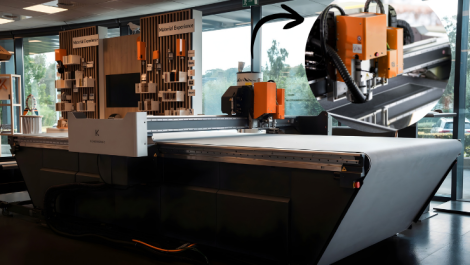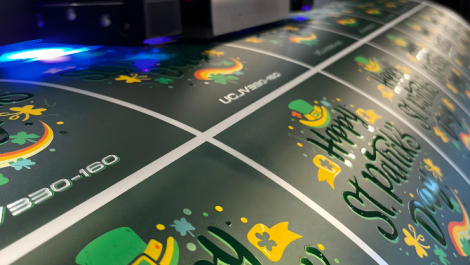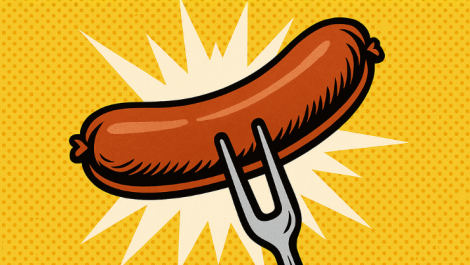The business end of the Risetec BR4, where book blocks for hard cover binding are end papered
New technology from Italian manufacturer Risetec gives digital printers single and four-clamp binding systems with integrated end papering and lining for hard cover books.
The exact origin and gestation process behind any new piece of technology is very often unknown to the wider print market. As an industry we are also accustomed to there being lengthy development and testing periods before a technology innovation comes to market.
Neither of these would seem to be the case with a new binding system from the Italian manufacturer Risetec, aimed at the digital printing market, and to be sold in the UK by Perfect Bindery Solutions (PBS). It was the centrepiece of an open house at another Italian manufacturer, thread sewing experts Smyth (whose equipment is also sold by PBS), in November, to which Digital Printer was invited.
Steve Giddins of PBS explained how the new product came about: ‘Risetech is a new supplier for us. We only met them in March, through introduction by Smyth. Immediately we started talking, I could see what a quality manufacturer they are. Between us and Smyth we persuaded them to build this 4-clamp binder for the digital market. They have been building binders for years, but bigger ones with 12 and 16 clamps and with gatherers; we said, that’s for the litho market, what we need is something for the digital market. This system did not even exist in a drawing in June.’
The system itself is called the Risetec BR 4. Its real standout feature, according to Mr Giddins, is its integrated end papering and lining for the hard cover digital print market – something that is not present on other perfect binders designed for digital, he said. Risetec has effectively downsized its proven end papering and binding technology to make a system that fits the needs of the market.
After a book is dropped in, a line of glue is run along the side; it attaches the end papers and presses them onto the book. This pressing process also informs the machine of the size of the book, so that it can automatically adjust for runs of one book. The book goes up into the clamp automatically, which transports it through the milling cutter, side gluing, spine gluing and back lining. What is delivered at the end of the machine is a book block ready for casing-in.
‘This is unique,’ said Mr Giddins. ‘It’s the first time this machine has been built. Risetec has used the same technology as it uses on its big machines but with less clamps, so it is proven technology. There are machines that will join the end papers with a piece of tape, but it can be very unstable to feed properly, and the distance between the two papers is crucial. If the book gets thicker, for example, you can’t wrap it around. That makes it extremely difficult for digital.’
The BR 4 is capable of both hard and soft cover bindings, hot melt and PUR, and has a decelerated drop, which carefully lowers a perfect bound book onto a belt, rather than throwing it down a shoot. Altogether, it has a maximum cycle speed of 1200 per hour, 600 to 800 for variable sizes. By the end of the year, the BR 4 will also include three-knife trimming, which was not quite ready for display at the Risetec/Smyth open house. Steve Giddins said the existing configuration would be priced at about £170,000.
Risetec is taking the technology down to fit it onto a still smaller binder too – the BRM: a single clamp binder capable of 600 cycles per hour and with integrated end papering, costing around £85,000. One UK printer, who was kicking the tyres of the BR 4 at the event, expressed the view that it was ‘very mechanical’, which was not meant in a derogatory way.
Risetec’s willingness to quickly take on new development work has impressed, as has its technical competence in finding solutions, according to Mr Giddins. One major UK book printer mentioned to the company a problem with feeding high speed digitally printed sections from a bundle into a binder. Risetec very quickly produced a demonstration feeding unit with a sensor to read marks separating the sections, thereby allowing faster binding (note: this is still in development).
Smyth’s Digital-88 automatic cross-folding and thread sewing system was also on display at the open house, which PBS is successfully bringing to the UK market, with recent sales to companies such as RS Bookbinders in Hockley, Essex, and Artemis Print in Newcastle.





